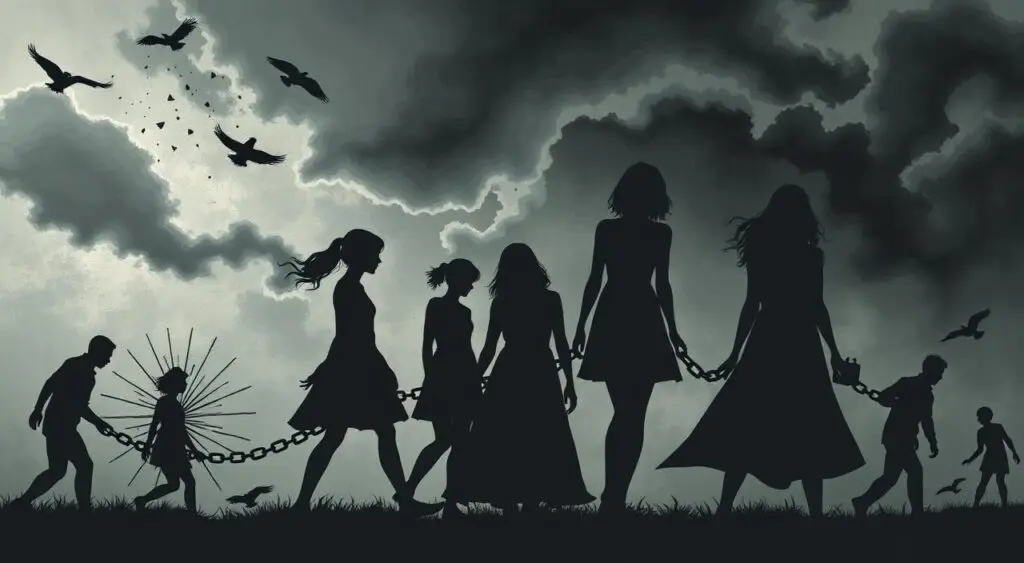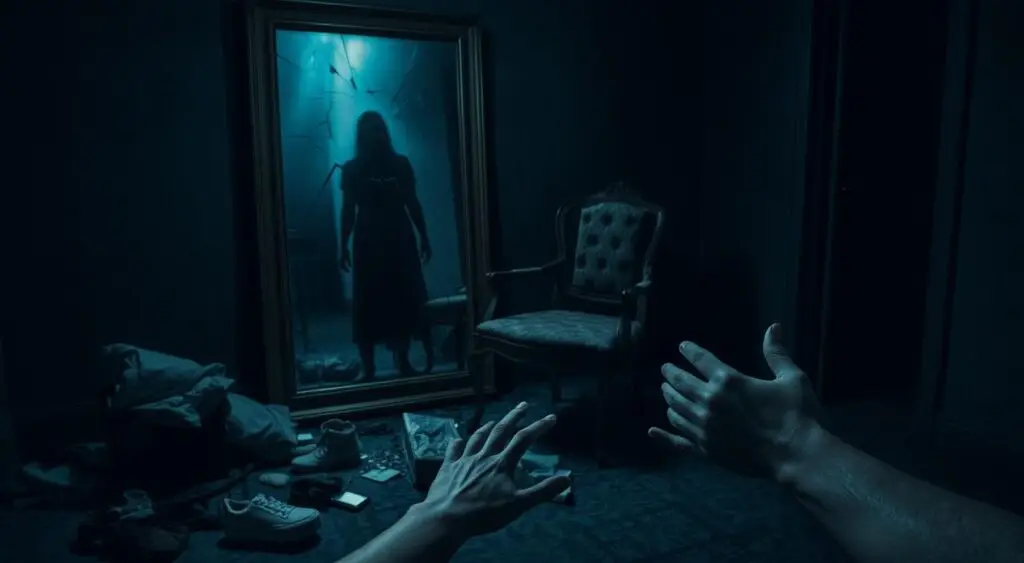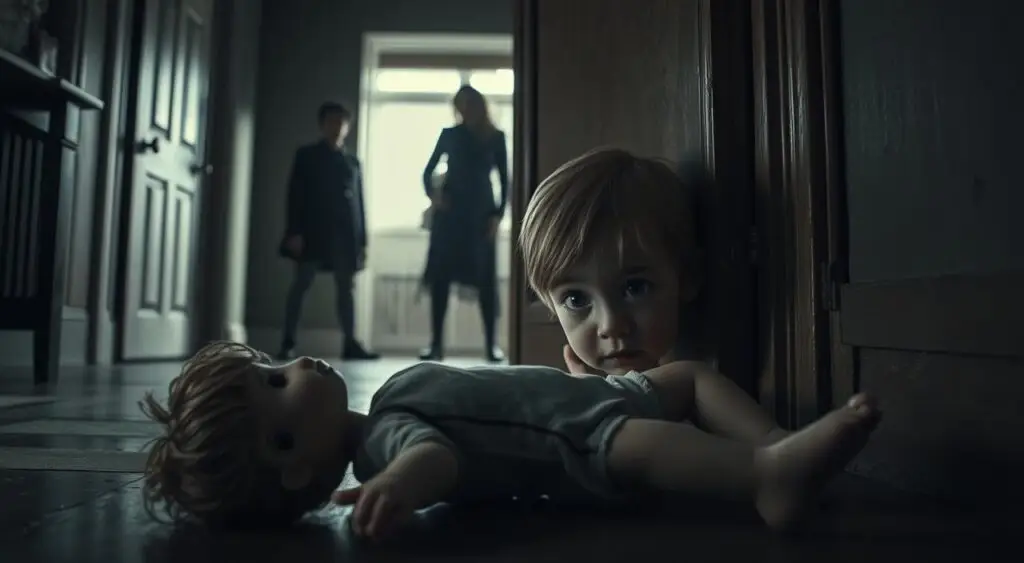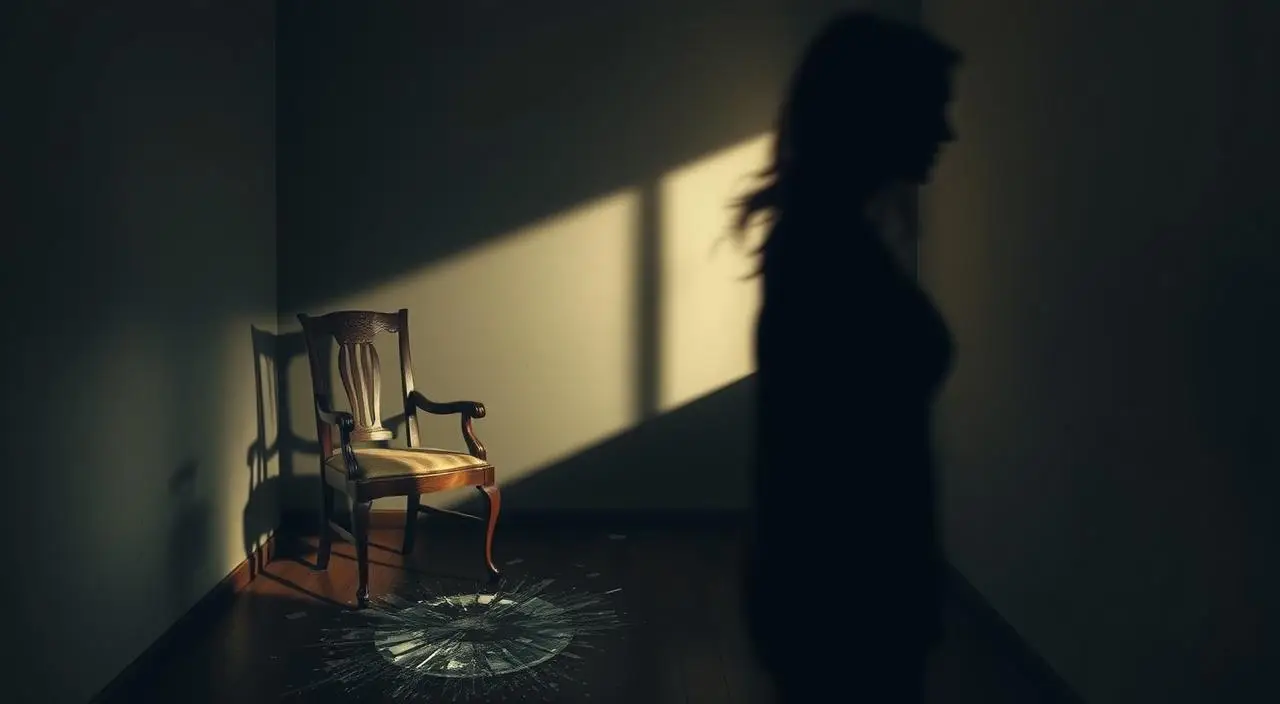His girlfriend’s fist hitting his face woke him up. It shattered the illusion of a healthy relationship. He thought violence had no place in love, yet he was stuck in a cycle of abuse1.
Wiping away tears, he felt confused and betrayed. How could someone he loved hit him? This wasn’t the life he wanted, and it was hard to accept1.Learn is it normal for my girlfriend to hit me?
If you’re in a similar situation, know you’re not alone. Domestic violence can affect anyone, regardless of gender1. It leaves deep scars, both physical and emotional. But with the right help, you can escape and start anew1.
Key Takeaways
- Domestic violence can happen to anyone, regardless of gender.
- Physical violence in a relationship is never normal or acceptable.
- Seeking professional help and support is crucial when dealing with an abusive partner.
- Establishing clear boundaries and prioritizing your safety is essential.
- Addressing underlying issues, such as mental health or substance abuse, can help break the cycle of violence.
Introduction
Domestic violence is often seen as a problem for women only. But, the truth is, anyone can be a victim, no matter their gender. Men can also face abuse from their female partners2. This belief is due to outdated gender stereotypes and a lack of knowledge about male victims.
Domestic violence affects both men and women. It’s important to see that abuse can happen in any intimate relationship3. Research shows many men have experienced abuse from their partners, proving it’s not just a women’s issue3. By tackling these myths, we can help everyone, regardless of gender, who has been abused.
Domestic violence can take many forms, like physical harm or emotional control4. Knowing that men can be victims too is key to helping them. It’s the first step in offering the right support and resources to all who have been abused.
“Domestic violence is not a gender-specific problem. It can affect anyone, regardless of their sex or gender identity.”
By breaking the myth that only women suffer from domestic violence, we can build a kinder society. A society that supports and empowers all who have been abused, no matter their gender4.
What is Domestic Violence?
Domestic violence is a wide term that includes physical, emotional, sexual, financial, or spiritual abuse. It happens when a family member or romantic partner is abused5. This abuse often comes from a power imbalance in the relationship, where one person controls the other5.
Domestic violence can be physical, like hitting, or emotional, like constant belittling5. It can also include stalking and psychological attacks5.
Studies show that about 41% of women and 26% of men face physical, sexual, stalking, or psychological abuse in their relationships.5 It’s important to understand all types of domestic abuse to tackle this big problem.
- Physical violence, like hitting, is a common form of abuse5.
- Emotional abuse can be verbal attacks or making someone feel worthless5.
- Sexual abuse includes any unwanted sexual acts, like rape5.
- Financial abuse happens when one partner controls the other’s money or job5.
- Spiritual abuse uses religious beliefs to control or punish a partner5.
Domestic violence often means one person has too much power over the other5. This can cause physical harm, mental health issues, and isolation5. It creates a cycle of violence that’s hard to break5.

It’s key to know about the different types of domestic abuse and the power issues involved5. By spotting the signs and getting help, people can escape the cycle of violence. They can work towards a better, fairer relationship5.
is it normal for my girlfriend to hit me
Exploring the Notion of Normalcy in Intimate Partner Violence
No, it’s not okay for your girlfriend to hit you. Intimate partner violence is abuse and should never happen1. Even if there’s rare, consensual physical play, repeated hitting is a sign of abuse1.
Many people think hitting in a relationship is normal6. But studies show men and women hit their partners equally in domestic violence cases6. This shows violence can happen in any relationship1.
Abuse, whether physical or emotional, can be very harmful1. It’s important to know the signs of abuse and get help1. By talking about this, we can make relationships healthier and more respectful for everyone.

If you or someone you know is being abused, get help1. There are resources and support services to help you stay safe1. You deserve to be treated with respect and dignity in your relationships.
Why Does My Girlfriend Hit Me?
Being hit by your partner is scary and confusing. It’s important to know that there’s no excuse for this behavior7. Domestic violence affects both men and women7. It’s key to set boundaries and have them respected in any relationship7.
Examining Potential Reasons Behind Physical Abuse
Many things might lead to your girlfriend’s behavior, but none justify hitting you8. Past trauma, a history of violence, and stress can cause people to act out8. Low self-esteem, impulse control, mental health issues, and feeling unloved can also play a part8.
You’re not to blame for your girlfriend’s actions. Getting help from advocates, counselors, or support groups is crucial7.

Physical violence in a relationship is never okay, no matter what8. Therapy can help address unhealthy patterns and keep you safe8.
Recognizing the Signs of an Abusive Relationship
Domestic violence can show up in many ways. It’s key to know the warning signs of an abusive relationship. Signs include your partner trying to control you, making you feel bad, ignoring you, threatening you or your family, and using physical violence.9 These actions are not okay and can harm you deeply.
One big warning sign is physical aggression, like hitting, choking, pushing, or other violent acts10. Also, emotional abuse, such as gaslighting, not showing love, or speaking for you in public, is very harmful10.
Financial abuse, seen in 99% of cases, is another red flag9. Stalking, found in 64% of abusive relationships, and digital abuse, affecting over half of teenagers, are also signs of trouble9.
Spotting the signs of an abusive relationship is key to staying safe. Domestic violence can lead to serious mental health issues, like depression, self-harm, and PTSD, and harm children too11.

If you or someone you know is being abused, getting help is crucial. You can call the 24-hour National Sexual Assault, Domestic, Family Violence Counselling Service on 1800 RESPECT. Or, reach out to local police or counseling services11.
The Impact of Childhood Domestic Violence on Adult Relationships
Seeing domestic violence as a kid can deeply affect a person’s future love life. Those who grew up in abusive homes might see violence as normal in love. This makes them more likely to be either the abuser or the abused as adults12. It’s key to tackle this issue to stop the cycle of abuse12.
Children who see domestic violence learn ways to cope that stick with them into adulthood12. They might not see abuse, feel hopeless, or struggle to move past being a victim13. This can lead to emotional and mental health issues, like anxiety and depression, making it hard to have good relationships.
The effects of seeing abuse as a kid can last a long time12. It can change how a person’s brain and body work, affecting their feelings and memory12. People who went through this might turn to unhealthy coping like eating disorders or substance abuse, making it tough to have healthy love in adulthood12.
It’s crucial to break the intergenerational cycle of abuse for those who saw domestic violence as kids13. While it’s hard, focusing on living well and forgiving abusers can lead to happier, more fulfilling relationships13.

“Memories of abuse tend to persist over time, impacting individuals emotionally and psychologically, with the difficulty of moving beyond the victim identity highlighted as a significant challenge.”
By understanding the long-term effects of witnessing abuse and working to end the intergenerational cycle of abuse, we can help those who experienced domestic violence as kids. They can then build healthier, more fulfilling relationships as adults.
| Challenges Faced by Victims of Childhood Domestic Violence | Strategies for Breaking the Cycle |
|---|---|
|
|
Seeking Support and Resources
If you’re facing abuse from your girlfriend, know you’re not alone. Many people, regardless of gender, deal with domestic violence. Asking for help is brave and shows you care about your safety and well-being14.
Domestic abuse can affect anyone. It’s key to know you have help and resources to support you15.
Hotlines, Shelters, and Counseling Services for Victims
There are many resources to help you during tough times. Domestic violence hotlines are always ready to offer support, info, and local service referrals14. Shelters provide temporary homes, counseling, and access to legal and medical help14.
Counseling services can help you deal with the emotional and psychological effects of abuse. They also help you heal and recover15.
Remember, asking for help is a sign of strength, not weakness. It’s a step towards ending the violence and regaining your safety and well-being16.
Don’t wait to explore these support options. Take the first step towards a safer, healthier future. Your safety and well-being are crucial15.
Breaking Free from the Cycle of Violence
Leaving an abusive relationship is tough but necessary for your safety. It’s a brave step towards a better life. You must plan carefully and set clear boundaries with your abuser.
Start by making a detailed safety plan. Find safe places to go and save money for emergencies. Make sure you have important documents and personal items. Also, think about how to protect yourself, like changing your routine or getting a restraining order17.
Setting strong boundaries is key to healing. This means stopping all contact, setting clear rules, and refusing abuse. You should feel safe, respected, and in charge of your life18.
Surround yourself with people who support you. This could be friends, family, or professionals. Look for counseling, support groups, and other resources to help you leave and heal18.
Leaving an abusive relationship is hard but you’re not alone. With good planning, boundaries, and support, you can escape the cycle of violence. You deserve a safe, healthy, and fulfilling life, free from fear and control.
“The first step is to acknowledge that the abuse is wrong and that you deserve a life free from violence and fear.” – Jane Doe, Domestic Violence Advocate
Navigating the Challenges of Being a Male Victim
As male victims of domestic violence, we often face extra hurdles. Societal stereotypes and the toxic influence of traditional masculinity make it hard to get help.
Overcoming Societal Stereotypes and Toxic Masculinity
Many believe men should be “tough” and can’t be victims of abuse. This belief stops us from seeking help, as we might feel ashamed or weak19. In fact, up to 26% of homosexual men, 29% of straight men, and 39% of bisexual men have been abused19. Also, 48% of men have faced psychological and emotional abuse by their partners19.
Getting accurate stats on male victims is hard because many don’t report abuse. This is due to fear or societal expectations19. Authorities also doubt male victims, seeing men as strong and women as weak19.
Like female victims, men stay in abusive relationships for many reasons. These include guilt, fear, financial reasons, and fear for children19. Emotional abuse is common in male relationships, making it hard to detect19. Female abusers might use threats or sneak attacks, as they’re smaller and weaker19.
It’s key for male victims to find support tailored to their needs20. One in three victims of domestic violence is male20. Many men feel ashamed or unable to protect themselves20. Lack of resources makes them worry about being believed by authorities20.
But, there are support services and hotlines for male victims. In the US and Canada, call 1-800-799-7233. In the UK, call 0182320.
“Emotional abuse targets can come from various backgrounds, including business owners, attorneys, professors, doctors, authors, homemakers, company presidents, and police officers21. The myth that emotional abuse victims have low self-esteem is debunked, as abusive individuals target them for their strengths, such as being selfless, faithful, trustworthy, generous, kind, compassionate, intuitive, forgiving, patient, courageous, resourceful, loyal, and desiring peace21.”
By fighting these harmful stereotypes and seeking support, male victims can break free from abuse. They can regain their self-worth and dignity20.
Self-Care and Healing
Being a victim of domestic violence can deeply affect your emotions and mind. It’s key for victims, no matter their gender, to focus on self-care and healing. This might mean getting mental health support, doing things that make you feel good, and being kind to yourself22. By taking care of themselves, victims can start to feel safe and powerful again.
Emotional abuse can be tricky to spot because it doesn’t have clear boundaries like physical or sexual abuse.22 People who have been emotionally abused might feel like they have PTSD. They might have flashbacks, trouble sleeping, or mood swings22. Doing things you enjoy, like hobbies or exercise, can really help with healing22. Exercise, for example, can make you feel happier by releasing special chemicals in your brain22.
Emotional abusers often make victims doubt reality and feel bad about themselves, leading to anxiety, depression, shame, and guilt.22 The first step to healing is to recognize and accept past emotional abuse22. Victims might struggle with feeling unworthy, being alone, or doubting others because of emotional abuse22.
Intimate partner violence affects millions in the United States every year.23 The Centers for Disease Control and Prevention (CDC) offers help for those who have been abused23. Healing after abuse is different for everyone and takes time23. Creating a safety plan can help you feel in control and safe23. It’s important to set boundaries after a breakup to manage communication and behavior23. Taking care of yourself and loving yourself is key to avoiding another abusive relationship23.
Learning about abuse signs, relationship dynamics, and how to leave can help prevent future abuse.23 Having a strong support system, including family, friends, therapists, and support groups, can help with healing23. It’s good to seek help from therapists, mental health professionals, and domestic violence hotlines for support and coping skills23. There are also events, programs, and support groups for survivors of abuse23.
Legal Recourse and Protective Measures
Victims of domestic violence, including men, have legal options and ways to stay safe. They can file for restraining orders, report abuse to the police, and explore other legal steps. Knowing their rights and legal options is key to escaping abuse.
Restraining orders, or protective orders, are a powerful tool for victims. These orders stop the abuser from contacting or approaching the victim. It’s important for victims to get legal help to get a restraining order, as rules vary by state.
Victims can also report domestic violence to the police. This can lead to criminal charges and penalties for the abuser. Reporting abuse is a crucial step to hold the abuser accountable and keep them away.
Going through the legal system can be tough, especially for those who have been through trauma. But, there are many organizations and resources to help. These include hotlines, shelters, and legal aid services. They can guide victims on their rights and how to protect themselves.
Choosing to take legal action is a personal decision. Victims should make choices that keep them safe. By understanding legal options, victims can start to take back control and end the cycle of abuse.
“The law is often the first line of defense for victims of domestic violence. By understanding their rights and the available legal protections, they can take the necessary steps to safeguard themselves and hold their abusers accountable.”
Conclusion
It’s never okay for your girlfriend to hit you, no matter what others think24. Domestic violence is a big problem that needs quick action24. By knowing the signs of abuse and getting help, we can stay safe and healthy.
Many people agree that hitting or restraining someone is wrong24. It’s important to set limits to keep a relationship strong24. Things like weight, grooming, and career goals can also affect how we feel in a relationship25.
You should always feel safe and respected in your relationships24. There are many resources available to help you24. Look for hotlines, shelters, and counseling for victims, and consider therapy for both of you24. Follow narcissismexposed.com for more guides.
By getting help and breaking the cycle of violence, you can focus on your well-being24. This way, you can take charge of your future.
FAQ
Is it normal for my girlfriend to hit me?
No, it’s not okay for your girlfriend to hit you. Any physical violence in a relationship is abuse. Even if it’s rare, non-consensual hitting is a sign of a bad relationship.
Why does my girlfriend hit me?
She might hit you for many reasons like past trauma or anger issues. But, none of these excuses the abuse. Knowing why she hits you can help, but she’s still responsible for her actions.
What are the signs of an abusive relationship?
Signs include trying to control you, being mean, ignoring you, or using violence. These are big red flags. They can hurt you emotionally and physically. It’s important to spot these signs to stay safe.
How can witnessing domestic violence as a child impact future relationships?
Seeing violence at home can shape your views on love. It might make you more likely to be abused or to abuse others. It’s key to understand this and seek help to change your path.
Where can I find support and resources if I’m experiencing domestic violence?
If you’re being abused, there’s help out there. Look for hotlines, shelters, and counseling. Getting help is a big step towards safety and healing.
What are the legal options and protective measures available to male victims of domestic violence?
Male victims have legal options like restraining orders and reporting abuse. Knowing your rights and legal options is crucial. It helps you take control and break free from abuse.
Source Links
- Inquiretalk.com | Girlfriend to Hit Me | Undeniable Signs | – https://inquiretalk.com/is-it-normal-for-my-girlfriend-to-hit-me/
- Why Is My Girlfriend So Mean to Me? 15 Possible Reasons – https://www.wikihow.com/Why-Is-My-Girlfriend-So-Mean-to-Me
- Domestic Violence and Abuse in Intimate Relationship from Public Health Perspective – https://www.ncbi.nlm.nih.gov/pmc/articles/PMC4768593/
- What to Do When Your Girlfriend Is Mad at You (10+ Steps to Take) – https://www.wikihow.com/What-to-Do-when-Your-Girlfriend-Is-Mad-at-You
- Is it Normal for My Girlfriend to Hit Me & How to Protect Yourself – https://hily.com/blog/is-it-normal-fo-my-girlfriend-to-hit-me/
- Is it normal for my girlfriend to hit me? Yes & No – https://www.psychmechanics.com/is-it-normal-for-my-girlfriend-to-hit-me/
- Ask Amanda: My Girlfriend Is Hitting Me – https://www.domesticshelters.org/articles/ask-amanda/ask-amanda-my-girlfriend-is-hitting-me
- My Girlfriend Hits me; is it Normal? 16 Proven Reasons She Does And what to do. – Legend Impact – https://legendimpact.com/my-girlfriend-hits-me/
- Recognising domestic abuse – Women’s Aid – https://www.womensaid.org.uk/information-support/what-is-domestic-abuse/recognising-domestic-abuse/
- 11 Signs of Emotional Abuse in a Relationship That You Should Never Ignore – https://www.allure.com/story/emotional-abuse-signs-relationship
- Domestic violence and abusive relationships – https://www.healthdirect.gov.au/domestic-violence-and-abusive-relationships
- Recognizing the effects of abuse-related trauma – https://www.camh.ca/en/health-info/guides-and-publications/recognizing-the-effects-of-abuse-related-trauma
- Some Thoughts About Victimization, Anger And Abuse – https://www.mentalhealth.com/library/anger-victimization-and-abuse
- Things that crossed the line for me – https://www.loveisrespect.org/resources/things-that-crossed-the-line-for-me/
- Domestic Violence and Abuse – HelpGuide.org – https://www.helpguide.org/relationships/domestic-abuse/domestic-violence-and-abuse
- Is It Normal for My Girlfriend to Hit Me? – https://www.marriage.com/advice/domestic-violence-and-abuse/is-it-normal-girlfriend-hit/
- What Most Miss About Reactive Abuse – https://themendproject.com/reactive-abuse/
- Why It’s So Difficult to Leave | Women Against Abuse – https://www.womenagainstabuse.org/education-resources/learn-about-abuse/why-its-so-difficult-to-leave
- Invisible Victims: Men In Abusive Relationships – https://www.doctornerdlove.com/men-in-abusive-relationships/
- Help for Men Who are Being Abused – HelpGuide.org – https://www.helpguide.org/relationships/domestic-abuse/domestic-violence-against-men
- How Do Abusive Men Pick Their Victims? – https://www.flyingfreenow.com/truth-about-domestic-abuse-victim/
- How to Heal From Emotional Abuse in Relationships: Therapist Approved Strategies [2022] – https://mindwellnyc.com/how-to-heal-from-emotional-abuse-in-relationships/
- 7 Tips to Heal After an Abusive Relationship – https://psychcentral.com/health/how-to-heal-after-an-abusive-relationship
- Is it normal for your girlfriend to slap you as a result of your own actions? – https://ask.metafilter.com/225124/Is-it-normal-for-your-girlfriend-to-slap-you-as-a-result-of-your-own-actions
- Why Did My Girlfriend Break Up With Me? She Left Out Of Nowhere – Relationship Hero – https://relationshiphero.com/blog/why-did-my-ex-girlfriend-break-up-with-me







